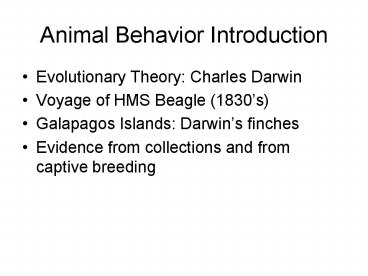Animal Behavior Introduction PowerPoint PPT Presentation
1 / 33
Title: Animal Behavior Introduction
1
Animal Behavior Introduction
- Evolutionary Theory Charles Darwin
- Voyage of HMS Beagle (1830s)
- Galapagos Islands Darwins finches
- Evidence from collections and from captive
breeding
2
(No Transcript)
3
Darwin After HMS Beagle Voyage
4
HMS Beagle
5
Publication
- Alfred Russel Wallace 1858
- The Origin of Species 1859
- 2,000 copies, sold out the first day
- Controversy over natural selection
6
(No Transcript)
7
Evolutionary Components
- Three Basic Components
- Variation (mutations) The role of chance
- Survival and reproduction
- Heritability Genes (Darwin didnt know about
Mendels experiments)
8
Variation in Genes
- Genes come in two forms, called Alleles
- Mutations are usually not successful or neutral
- Beneficial ones give the carrier an advantage
9
Survival
- Malthus Populations theoretically can grow at an
exponential rate - Sea turtles for example, produce nests of 100
eggs, 4 to 6 times per season - Begin with 1 male and 1 female 500eggs
- 250 males and 250 females 125,000 offspring
- 62,500 females 31,250,000 offspring
10
Competition
- Not all offspring survive
- Mortality due to competition for limited
resources - Mortality due to predation
- The so-called Survival of the fittest (Herbert
Spencer)
11
Reproduction
- Fitness Success at reproduction
- Individual Fitness (Darwin), and Inclusive
Fitness (Hamilton) - Offspring must be viable to count as a fitness
unit (species recognition is very basic)
12
Mules are a cross between a horse and a donkey
and are sterile
13
Heritability
- Genes are the unit of heritability
- Bodies are vehicles for genes
- Genes code for proteins
- The genome and environment to produce the
PHENOTYPE which drives evolution
14
Vole mating systems
- Male reproduction is potentially great, female
reproduction is limited - Sperm vs. egg
- Internal fertilization and development
- Delivery and care of young
- So why do prairie vole males agree to be
monogamous?
15
Monogamous Prairie Voles
16
Pup Retrieval (Male Parental Behavior)
17
Levels of Explanation
- Ultimate Causes The evolutionary history and the
fitness advantage of the trait - Proximate Causes Those things that occur during
the lifetime of the individual including genes,
developmental processes, sensory capacities,
learning and so on
18
Prairie voles
- A gene for social bonding, V1aR
- Increased sensitivity to a hormone, vasopressin,
in the ventral pallium, due to V1aR gene
19
Prairie Vole Brain
20
Experimental Test
- Inject V1aR genes into the ventral pallium
- Should increase bonding with female, even without
mating - Control gets V1aR in Caudate Putaman or another
gene in the VP or CP - Results of time spent with familiar or unfamiliar
female
21
Genes Added to Ventral Pallium and Control Groups
22
Proximate cause of Monogamy in Prairie Voles
- The Proximate cause of monogamy in Prairie Voles
is - The V1aR gene which
- Increases the number of vasopressin receptors in
the ventral pallium which - Makes him bond to a single female
23
Ultimate Cause of Monogamy in Prairie Voles
- Females are widely dispersed
- Unguarded females are subject to sperm
competition, and offspring are subject to
infanticide by other males
24
(No Transcript)
25
(No Transcript)
26
Infanticide as an Adaptation
- Adaptation A specially designed process that
solves an important problem in the environment - Is infanticide an adaptation? Yes, it gets a
lactating female back to sexual receptivity. No,
its due to abnormal circumstances (crowding).
No, its to limit the population because of
resource scarcities.
27
Infanticidal Species
- Common house mouse, Mus musculus
- Lions when a male takes over a pride
- Hanuman Langurs - new male in the group
28
Infanticide by a male lion
29
Females and their offspring
30
Male langurs commit infanticide
31
Why Infanticide?
- Group Selection? Prevent overpopulation and
depletion of resources (Wynne Edwards) - In general, Group Selection cannot work.
- Individuals who sacrificed themselves for the
good of the group would not have genetic input,
only the selfish would (George Williams)
32
33
Individual Fitness Explanation of Infanticide
- Male lions only control a pride for about 2 years
- Mice that mate with a female show inhibited
infanticide 18 days later - Langurs do not show inhibited infanticide when
population densities are low - Its always an intruder male that commits
infanticide

